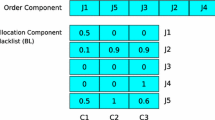Abstract
Modern computing and networking environments provide the important problems of efficient using such resources as energy and cores or processors. It is based on the possibility of dynamically varying the speed of processors and using parallel calculations in the execution of operations. We consider the NP-hard speed scaling scheduling problem with energy constraints and parallelizable jobs. Each job must be executed on the given number of processors. Processors can vary their speeds dynamically. It is required to assign speeds to jobs and schedule them such that the total completion time is minimized under the given energy budget. An adaptive genetic algorithm with optimized crossover operators is proposed. The optimal recombination problem is solved in the crossover operator. This problem is aimed at searching for the best possible offspring following the well-known gene transmitting property. The experimental evaluation shows that the algorithm outperforms the known metaheuristics and demonstrates the perspectives of using adaptive techniques and optimized operators.
Access this chapter
Tax calculation will be finalised at checkout
Purchases are for personal use only
Similar content being viewed by others
References
Albers, S., Fujiwara, H.: Energy-efficient algorithms for flow time minimization. ACM Trans. Algorithms 3(4), 17 (2007)
Benoit, A., Canon, L., Elghazi, R., Heam, P.: List and shelf schedules for independent parallel tasks to minimize the energy consumption with discrete or continuous speeds. J. Parallel Distrib. Comput. 174, 100–117 (2023)
Blum, A., Eremeev, A., Zakharova, Yu.: Hybridizations of evolutionary algorithms with large neighborhood search. Comput. Sci. Rev. 46, 100512 (2022)
Bunde, D.P.: Power-aware scheduling for makespan and flow. J. Sched. 12, 489–500 (2009)
Caponio, A., Neri, F., Tirronen, V.: Super-fit control adaptation in memetic differential evolution frameworks. Soft Comput. 13(8), 811–831 (2009)
Dahal, K., Tan, K.C., Cowling, P.I.: Evolutionary Scheduling. Springer (2007). https://doi.org/10.1007/978-3-540-48584-1
Drugan, M.M.: Reinforcement learning versus evolutionary computation: a survey on hybrid algorithms. Swarm Evol. Comput. 44, 228–246 (2019)
Gao, K., Huang, Y., Sadollah, A.: A review of energy-efficient scheduling in intelligent production systems. Complex Intell. Syst. 6, 237–249 (2020)
Gen, M., Lin, L.: Genetic algorithms and their applications. In: Pham, H. (eds) Springer Handbook of Engineering Statistics. Springer Handbooks. Springer, London. (2023). https://doi.org/10.1007/978-1-4471-7503-2_33
Gerards, M.E.T., Hurink, J.L., Holzenspies, P.K.F.: A survey of offline algorithms for energy minimization under deadline constraints. J. Sched. 19, 3–19 (2016)
Drozdowski, M. (ed.): Scheduling for Parallel Processing. Springer (2009). https://doi.org/10.1007/978-1-84882-310-5
Kellegoz, T., Toklu, B., Wilson, J.: Comparing efficiencies of genetic crossover operators for one machine total weighted tardiness problem. Appl. Math. Comput. 199(2), 590–598 (2008)
Kononov, A., Zakharova, Yu.: Speed scaling scheduling of multiprocessor jobs with energy constraint and makespan criterion. J. Glob. Optim. 83, 539–564 (2022)
Kononov, A.V., Zakharova, Y.V.: Speed scaling scheduling of multiprocessor jobs with energy constraint and total completion time criterion. Int. J. Artif. Intell. 21(2), 109–129 (2023)
Kong, F., Guan, N., Deng, Q., Yi, W.: Energy-efficient scheduling for parallel real-time tasks based on level-packing. In: Proceedings of the 2011 ACM Symposium on Applied Computing, pp. 635–640 (2011)
Li, K.: Energy efficient scheduling of parallel tasks on multiprocessor computers. J. Supercomput. 60, 223–247 (2020)
Lopez-Ibanez, M., Dubois-Lacoste, J., Perez Caceres, L., Birattari, M., Stutzle, T.: The irace package: iterated racing for automatic algorithm configuration. Oper. Res. Perspect. 3, 43–58 (2016)
Mara, S.T.W., Norcahyo, R., Jodiawan, P., Lusiantoro, L., Rifai, A.P.: A survey of adaptive large neighborhood search algorithms and applications. Comput. Oper. Res. 146, 105903 (2022)
Neri, F., Cotta, C.: Memetic algorithms and memetic computing optimization: a literature review. Swarm Evol. Comput. 2, 1–14 (2012)
Pruhs, K., Uthaisombut, P., Woeginger, G.: Getting the best response for your erg. ACM Trans. Algorithms 4(3), 17 (2008)
Reeves, C.: Genetic algorithms for the operations researcher. INFORMS J. Comput. 9(3), 231–250 (1997)
Salido, M.A., Escamilla, J., Giret, A., et al.: A genetic algorithm for energy-efficiency in job-shop scheduling. Int. J. Adv. Manuf. Technol. 85, 1303–1314 (2016)
Shabtay, D., Kaspi, M.: Parallel machine scheduling with a convex resource consumption function. Eur. J. Oper. Res. 173, 92–107 (2006)
Slowik, A., Kwasnicka, H.: Evolutionary algorithms and their applications to engineering problems. Neural Comput. Appl. 32, 12363–12379 (2020)
Smith, J.E.: Self-adaptative and coevolving memetic algorithms. In: Neri, F., Cotta, C., Moscato, P. (eds) Handbook of Memetic Algorithms. Studies in Computational Intelligence, vol. 379. Springer, Berlin, Heidelberg. (2012). https://doi.org/10.1007/978-3-642-23247-3_11
The repository with genetic algorithm results. https://github.com/mysosnovskaya/genetic_algorithm_results. Accessed 22 Jan 2024
Wu, X., Che, A.: A memetic differential evolution algorithm for energy-efficient parallel machine scheduling. Omega 82, 155–165 (2019)
Zakharova, Yu., Sakhno, M.: Heuristics with local improvements for two-processor scheduling problem with energy constraint and parallelization. NUMTA 2023 180 (2023 )
Acknowledgements
The research was supported by Russian Science Foundation grant N 22-71-10015.
Author information
Authors and Affiliations
Corresponding author
Editor information
Editors and Affiliations
Rights and permissions
Copyright information
© 2024 IFIP International Federation for Information Processing
About this paper
Cite this paper
Zakharova, Y.V., Sakhno, M.Y. (2024). Adaptive Genetic Algorithm with Optimized Operators for Scheduling in Computer Systems. In: Shi, Z., Torresen, J., Yang, S. (eds) Intelligent Information Processing XII. IIP 2024. IFIP Advances in Information and Communication Technology, vol 703. Springer, Cham. https://doi.org/10.1007/978-3-031-57808-3_23
Download citation
DOI: https://doi.org/10.1007/978-3-031-57808-3_23
Published:
Publisher Name: Springer, Cham
Print ISBN: 978-3-031-57807-6
Online ISBN: 978-3-031-57808-3
eBook Packages: Computer ScienceComputer Science (R0)





